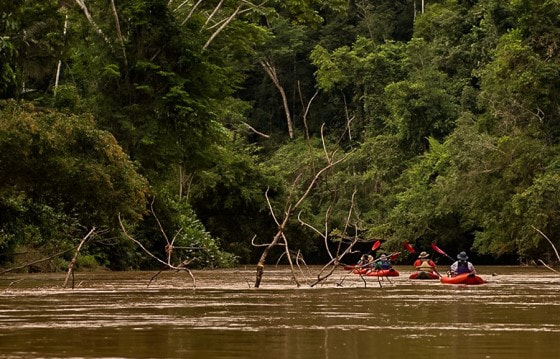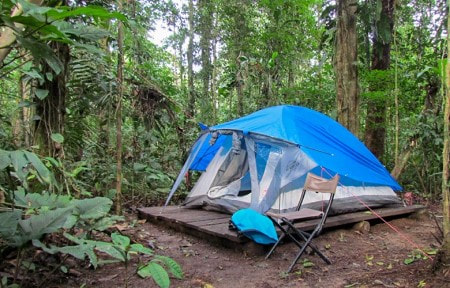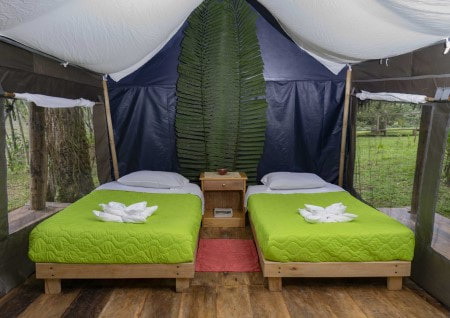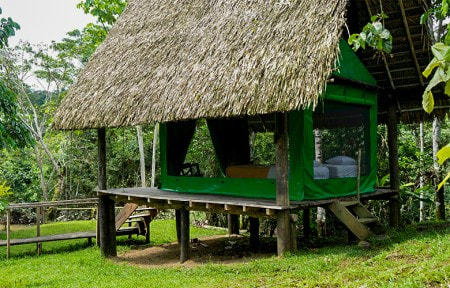Amazon Kayaking Adventures in Ecuador
5 Day AdventureDay 1: Along the Tiputini
Upon your arrival in Coca (bus terminal or airport), you will be picked up by your local guide who will take you to "Maitos del Yasuní", a typical restaurant created by the association Challuwa Mikuna to benefit indigenous women, where you can enjoy a delicious traditional breakfast (not included). You’ll then begin your journey of about an hour 40 minutes in land transport to the entrance of the Yasuni National Park and the Tiputini river, where kayaks and equipment will be ready to begin our adventure. During the first part of our journey, we’ll row along the majestic Tiputini surrounded by nature and wildlife, with the Yasuni National Park on our right. Along the way we’ll have the opportunity to observe a variety of birds and animal life, possibly including the golden oriole (oropéndola), caciques, hoatzins, guacamayos, toucans, kingfishers, parrots, monkeys, snakes and more. We’ll stop along the river for a lunch, then continue to a small basic campsite nestled in the jungle along the river where we’ll have a chance to relax a bit, then we’ll have a delicious welcome dinner in the home of a local kichwa family. Day 2: Parrot Clay Lick
After a delicious breakfast, we’ll pass through a part of the community of Mandari Panga where we can observe some small farms of yuca, plantain, coffee, cocoa, and other edible and medicinal plants. After our visit, we’ll walk along a community trail through the forest for about 40 minutes, crossing the small Rumi Yacu (“River of rocks”) and arriving at a spectacular parrot clay lick, a rock and clay wall with a high concentration of minerals where a number of parrots, parakeets, and papagayos come to lick the clay to detoxify and clean their systems of the toxins accumulated in their normal diets and to help with digestion. Other wildlife can often be seen here as well, this is an impressive attraction offering a close up view of many beautiful bird species, these “saladeros” are not easy to find and do not exist in all of the Amazon region. After this spectacle, we’ll continue our journey in kayaks along the Rumi Yacu river to the Tiputini, and continue deeper into the jungle with the opportunity to observe many distinct species of animals such as species of monkey, capybaras, and other mammals, plus a great variety of birds such as herons, flycatchers, woodpeckers, wild turkeys, and falcons. We’ll enjoy a lunch along the way, arriving at the Mandari Panga camp along the banks of the Tiputini and Yutzo rivers in the afternoon, when we’ll settle in to our comfortable tents. Our chef will prepare a delicious dinner, and afterwards we’ll finish the day with a marvelous night walk of about an hour to enjoy the immense variety of creatures that are active at night, possibly including snakes. Located in an isolated zone of nearly untouched rainforest within the Yasuni National Park, one of the most biodiverse areas on the planet, this campsite is designed to give visitors the most authentic experience possible in this fantastic region. They offer accommodations in comfortable tents, safari style, instead of enclosed cabins. Connect with the jungle in a way not possible in a traditional lodge; experience the sounds of the birds, animals, and rivers and sense your surroundings in your sheltered, elevated comfortable tents. Day 3: Exploring the Anaconda Lagoon
After an early breakfast, we’ll take our kayaks along the Tiputini until we arrive at the entrance for Amarun Cocha, Lake of the Anaconda in the local kichwa language. Our journey will be about 3 and a half hours, passing through pristine jungle along the way. This is a small blackwater lagoon in the heart of the pristine rainforest of Yasuni, and is home to the largest snake on the planet, the anaconda. With luck we might see this amazing creature while enjoying the stunning scenery of this region of flooded forest, where we might also see the legendary piranhas, caymans, boas and more. We’ll return to our camp in motorized canoe where a delicious lunch will be waiting for us, and after some time to relax we’ll depart to try our luck with fishing for piranhas and other species of fish with the chance to spot other wildlife along the way. We’ll return to camp at sunset, with the chance to experience the amazing night sky of the Amazon from the river and we may spot other wildlife active at night, such as capybaras, pacas, frogs, and possibly caymans. Our chef will have a delicious dinner ready for us when we return to camp. Day 4: Huangana trail and Casa de la Abuela After breakfast, we’ll begin a hike of about 4-5 hours through the primary forest of Yasuni National Park along a trail called the Huangana (the white lipped peccary in Kichwa). With luck we may encounter peccaries, large monkeys or other wildlife along the way. We’ll also learn about the rich flora and fauna of the zone and some of the medicinal plants of the region. We’ll return to camp for lunch, and then we’ll navigate in our motorized canoe for about 15 minutes upriver to visit the home of the founder of the community, the Casa de la Abuela. Considered the Harpy Eagle’s nest of the area, this traditional home is situated on a 50 meter high hill with an incredible view of the surroundings. Here we’ll learn about the way of life in the jungle, and the history and traditions of the community. We’ll learn how the traditional drink, chicha, is made, and we’ll also learn how chocolate is made from the harvest of cacao. At the end of the day, we’ll enjoy the sunset from this incredible viewpoint with the spectacular radiant colors of the Amazon. Return to camp for dinner. Day 5: Departure After our final breakfast in the Amazon, we’ll travel upriver in our motorized canoe for about an hour and a half to reach the Pindo bridge, where our transportation will be waiting to take us back to Coca (about an hour and 40 minutes). We’ll drop you off at the airport or bus station to return to Quito or continue on your journey. To get to Coca from Quito, there are daily flights from Quito which take about 40 minutes each way. There are also frequent buses departing from the Quitumbe terminal in the south of Quito which cost about $12.50 each way, and there is an office in the Mariscal district where bus tickets can be purchased up to 3 days in advance. Most clients traveling to Coca by bus take a night bus, these depart Quito around 23:00 daily and arrive in Coca around 6 AM. 2023 price per person in US$: $1497 with 2-3 people, $1409 with 4+. .single supplement = $425 Monday departures. Can arrange departures on other days for 2 or 3 passengers with a supplement of US$197.00 per person. With more than 4 passengers there is not a supplement. Included in the amazon tours:
Not included in the amazon tours:
What to Bring:
|
7 Day AdventureDay 1: Arrival in Coca
Upon arrival in Coca, you will be picked up by your local guide who will take you to "Maitos del Yasuní", a typical restaurant created by an indigenous women association, where you can have breakfast (not included). The journey begins with about 90 minutes in land transport and another 90 minutes in a motorized canoe along the Tiputini river. You will arrive at the camp, where you will have time to get to know the facilities and settle. Enjoy a welcome drink, then a delicious lunch will be served in the main house. Located in an isolated zone of nearly untouched rainforest within the Yasuni National Park, one of the most biodiverse areas on the planet, this campsite is designed to give visitors the most authentic experience possible in this fantastic region. We offer accommodations in comfortable tents, safari style, instead of enclosed cabins. Connect with the jungle in a way not possible in a traditional lodge; experience the sounds of the birds, animals, and rivers and sense your surroundings in your sheltered, elevated comfortable tents. In the afternoon, we’ll cross to the other side of the Yitsu Yacu River for a walk of approximately 2 hours. You will end the afternoon enjoying the sunset on board our motorized canoe, and when you return a delicious dinner served by candlelight will be ready for you. There are 2 bathroom structures, each with 2 showers and 2 ecological dry toilets. Hot water is not available at the camp. The camp has a solar panel which is sufficient to charge batteries, but otherwise there is no electricity at the camp Day 2: Hiking the "Pecary Trail"
After an early breakfast (06h30), we’ll cross to the other side of the Tiputini river in a traditional canoe to start a walk of approximately 4 hours along a loop trail, passing through spectacular virgin jungle. We’ll arrive at the lagoon of the anacondas where, with luck, you will be able to see this reptile so characteristic of the area. We’ll return to camp for lunch and you’ll have time to relax in your tent, walk around the campsite and even cool down with a swim in a tranquil tributary of the Tiputini river. In the afternoon, we’ll enjoy a pleasant traditional canoe trip in the Pishña lagoon (giant otter oxbow lagoon) of about 2 hours. This is a very interesting ecosystem, a blackwater lake where unique species live. We’ll enjoy the sunset and then return to the camp for dinner. Day 3: Rio Tiputini and the Casa de la Abuela Early in the morning, we’ll begin a trip along the Tiputini River in a traditional wooden canoe, and have breakfast during the trip while we enjoy the sunrise. During our trip we should be able to observe a wide variety of wildlife from our canoe, from diverse bird species to monkeys, river otters, river dolphins and much more; you’ll be back at the camp around 11H30. After our visit we’ll have a delicious lunch, and have the chance to share with the staff of Mandari Panga who will offer you some of their handmade crafts. Time for a short rest or a swim, then around 15:30 we’ll depart in our motorized canoe for the Casa de la Abuela (Grandmother’s House), a traditional home where the matriarch of the community still lives. We’ll learn about how traditional chocolate is made, which we’ll serve with our dinner this evening. Time to enjoy amazing views of the sunset from this hilltop home, then we’ll return to camp for a delicious dinner. After dinner, we can take an optional night walk along a short trail called the Tucán Trail near the camp, about an hour in duration. Day 4: Visit the Parrot Clay Lick After breakfast, we’ll travel by canoe to a small river named Rumiyacu and guided to a parrot clay lick. Normally many birds can be seen during the trip, and at the clay lick there are typically various colorful species of parrots we can observe. We'll return to the camp around noon to have lunch, and then have some time to rest and relax or take a swim in the river. Around 3 pm, we’ll kayak down the Tiputini river for a couple hours. We will stop on a river beach to make camp, while the canoe driver and cook put together the camp, you and your guides will do some fishing, looking for typical freshwater species such as pirañas and catfish. This will be prepared for your dinner Day 5: Exploring the Anaconda Lagoon After an early breakfast, we’ll take our kayaks along the Tiputini until we arrive at the entrance for Amarun Cocha, Lake of the Anaconda, in the local kichwa language. Our journey will be about 3 hours, passing through pristine jungle along the way. This is a small blackwater lagoon in the heart of the pristine rainforest of Yasuni and is home to one of the largest snakes on the planet, the anaconda. With luck, we might see this fantastic creature while enjoying the stunning scenery of this region of flooded forest, where we might also see the legendary piranhas, caymans, boas, and more. We’ll have a packed lunch on a river beach. In the afternoon, we will explore more of the area and hike for a couple hours until reaching our next camping site. Around 4 pm we will make camp and enjoy the a quiet evening with the sounds of the jungle. Day 6: Deep Amazon Kayaking Adventure, return to Mandari Panga After an early jungle breakfast, we’ll have a chance to kayak further down the Tiputini river for about 2.5-3 hours. Around noon we will jump on the motorized to start our return to Mandaripanga camp. We will make a stop to have lunch in the canoe. After a quick rest on a river beach, we will hike back to the campsite. We’ll return to camp at 6 pm, with the chance to experience the fantastic Amazon, and we may spot other wildlife active at sunset, such as capybaras, pacas, and frogs. Once we arrive, you can take a nice shower to help you to relax, at about 7 pm a delicious Amazonian dinner will be ready for you. Day 7: Return to Coca Breakfast will be served early in the morning (depending on the time of the group's flight departure). We'll begin our trip in our motorized canoe for about an hour and a half; during the relaxing trip, you can say goodbye to the beauty of the Amazon rainforest. We'll then be met at the shores of the river and travel overland for about an hour and a half back to Coca, where you'll be dropped off at the airport or bus terminal for your return to Quito or travel to your next destination. 2023 price per person in US$: $1657 with 2-3 people, $1559 with 4+. .single supplement = $469 Monday and Friday departures. Can arrange departures on other days for 2 or 3 passengers with a supplement of US$197.00 per person. With more than 4 passengers there is not a supplement. Note: If you prefer more comfortable accommodations, day trips of kayaking on the lake are available in packages at La Selva Lodge The community of Mandari Panga began in 1980 when a group of families decided to leave their home in the community of Canelos because of persecution by the Huaoarini, who had killed members of the community. They originally came from small communities in the Pastaza and Napo provinces, whose residents belonged to the Naporuna and Canelo ethnic groups who had called the banks of the Pastaza and the Napo rivers their home for thousands of years.
The group finally set up their new home on the left bank of the Tiputini river, just outside of the boundaries of what is now the Yasuni National Park, which was officially formed in 1989. The community of Mandari Panga, named for a native plant with leaves that extend across the ground, is the original settlement and still manages its lands communally. Since 1994 the community has had legal title to their land, but individuals are assigned an area to live, do not have rights to sell, and have restrictions as to what they can do with the land they live on.The community is administered by a General Assembly, the highest authority to deal with issues of commune organization, development, improvements (construction and improvement of the communal house, communal dining room, education, mingas of cleaning of the neighborhood roads and Sports fields) and project management. All actions and decisions are approved by the general assembly. |




